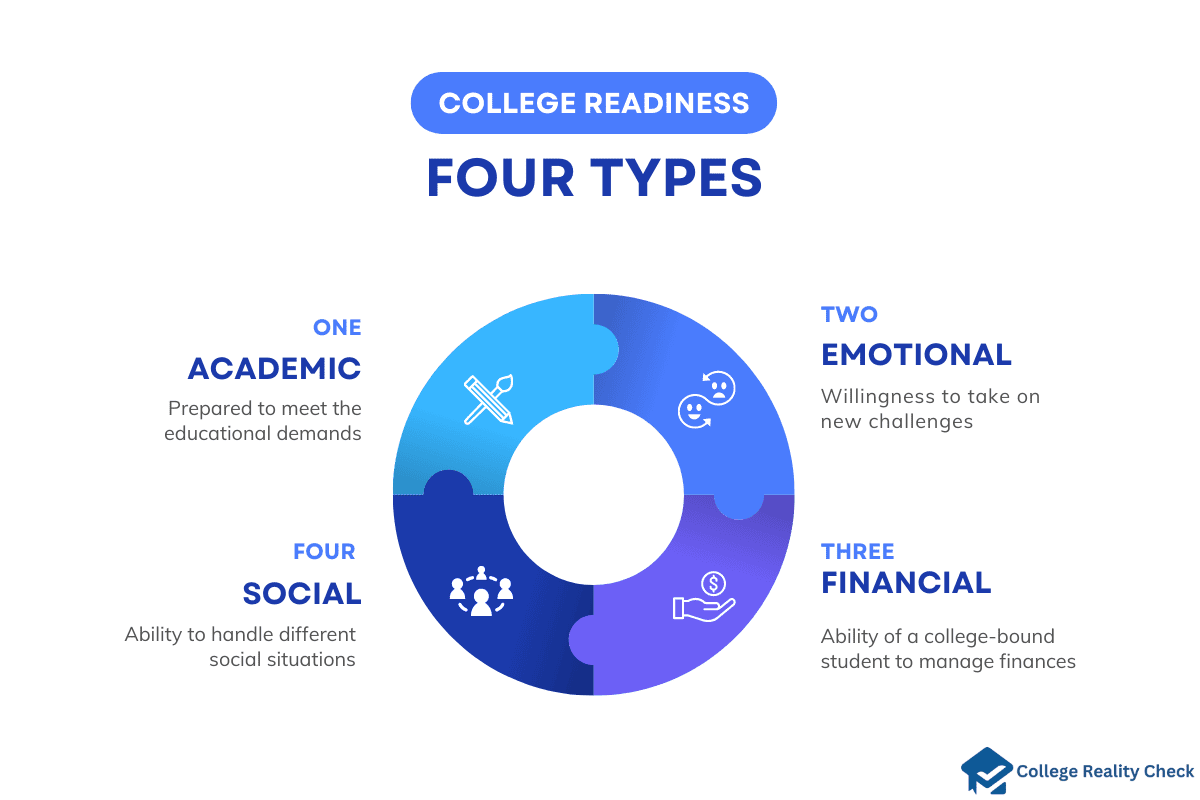15 Surefire Signs You’re College-Ready (Plus, Take Our Quiz to Find Out!)
Some college admissions officers determine college readiness through test scores.
While a 1570 composite SAT score may speak volumes about your academic preparedness, there’s nothing about it that can indicate your readiness for college emotionally, socially and financially.
Am I ready for college?
Answering this is as simple as introspecting and looking for signs of college readiness.
There are no multiple-choice questions and essay prompts to answer — you just have to look at some of your traits and behaviors to know whether or not you are ready for a stage bigger than high school.

Indicators You’re All Set for College
Not all graduating high schoolers are the same.
However, teenagers primed to take on the many challenges of higher education and enjoy the various perks of having a bachelor’s degree share certain things in common.
What does it mean to be ready for college?
I will give you 15 telltale signs below.
You Survived College Prep and College-Level Courses
College preparatory courses equip high schoolers with the skills required for college.
It’s no wonder that many postsecondary institutions, selective and not-so-selective alike, require them.
Typically, these courses are the following:
- English
- Math
- Science
- Social studies
- Foreign language
Some colleges require or recommend two to three units of them, but taking four units is common, too.
Besides college prep courses, many admissions officers also want to see AP courses.
AP courses are college-level courses, and completing them proves you are college-ready — it can also help increase your chances of getting into your top-choice college as AP courses increase academic rigor and boost weighted GPA.
You Know What Career You Want
An accountant, engineer, website designer, nurse, journalist, or educator.
Regardless of what you want to be, what’s important is you know what you want to be.
That’s an unmistakable indicator you are all set for college — a college degree related to your dream profession is all that’s left for you to have to turn it into a reality.
You Know What You Want to Study
Nothing can be a clearer sign of college readiness than knowing the right degree program for you.
Spending time researching various majors and identifying the ones related to your interests and preferred career means you have an established academic and career path even before your college life begins.
But just because you have no major in mind doesn’t necessarily mean you are not ready for college.
Most colleges welcome undecided students — students who have no intended majors.
Taking elective courses, participating in extracurricular activities, and meeting with the institution’s career and academic advisors can help you decide on a career path for you.
You Have a Support System You Can Count On
You will indeed be all alone in a new environment.
However, you don’t have to be on your own.
Having the support of everyone from your family, friends, to mentors means the guidance and encouragement you will need as you pursue an undergraduate degree are just a phone call, text, or email away.
You Can’t Wait to Meet New People
A college campus is where you can earn a degree.
It’s also where you can make friends, most of whom could be your friends for life, and meet contacts, most of whom might have job referrals or offers after college.
You appreciate and treasure all your friendships in your high school and your hometown.
However, there are eight billion people on the planet — wouldn’t it be nice to meet as many of them as possible?
You Want to Learn From Others’ Perspectives
In college, it’s not just in classrooms where you will learn something.
You can also obtain knowledge everywhere, from your dorm to the quadrangle.
A college campus is far more diverse than your high school campus.
There are students from inside and outside the state, from inside and outside the country, and from various ethnic and racial backgrounds, cultural identities, religious cultures, income levels, and gender preferences/identities.
You are set for college if you are open-minded enough to welcome unique perspectives and experiences.
You Can Express Yourself Effectively
Given that a college campus has a diverse population, having good communication skills is a plus.
You need others to understand you accurately in various scenarios.
They include discussions in the classroom, studying with a group, completing a group project, practicing for a stage play, participating in debates, and playing basketball or volleyball.
It’s also crucial to communicate well for internships, part-time jobs, and even study-abroad programs.
Fret not if you are not 100% confident about your ability to communicate effectively.
In college, you can polish your communication skills, which can open doors to more job opportunities, for it’s the key to collaborative work and productivity in the workplace.

You Feel Comfortable With Change
College is an entirely different world from high school.
From where you live to your everyday schedule, everything’s different.
You can’t stop these changes — you have to adapt to them!
Chances are that you are ready for college if you have accepted that things will not be like high school, and you are ready to display flexibility and resilience, especially during the first few weeks or semesters of your college career.
You Have Established Good Study Habits
Good study habits can increase your confidence and competence.
They can reduce your anxiety and doubts when tests, projects, and research work come your way.
Having effective study skills allows you to reduce the number of hours poring over books and printouts, thus allowing you to spend some time outside your dorm or the library to unwind and have some fun.
You are also less likely to suffer from burnout, which four out of five undergraduate students experience.
You Don’t Need Someone to Push You
Living on campus, your parents or guardians aren’t around to remind you to do your tasks.
You have to motivate yourself to wake up early, go to class on time, complete assignments and projects, review for exams, show up at your part-time job, etc.
Having self-motivation means you don’t need anybody to push you to succeed.
It drives you to set goals and adhere to plans to meet them.
It also gives you the right mindset to persist in the face of challenges, which comes aplenty in college.
You Can Take Charge of Things
Going hand in hand with motivation is initiative.
There’s no point in feeling determined to succeed in college if you do not make things happen.
Being initiative gives you an edge over your peers — you deal with problems that others may not realize require solving, and you go out of your way to learn and develop.
It also allows you to be resourceful.
Through such, you actively seek information, tools, support, and ways to succeed.
True enough, research says that academic stress unfavorably impacts the grades of students low in resourcefulness but has no effect whatsoever on the grades of highly resourceful students.
You Know How to Manage Your Time
College students have a lot of things going on academically, socially, and personally.
Indeed, having superb time management skills indicates that you are ready for the college experience.
Effective management of your time is essential for meeting deadlines, preparing adequately for exams, participating in extracurricular activities, and spending time with your newfound friends.
Of course, it’s also vital for you to get enough rest and relaxation.
According to the International Journal of Psycho-Educational Sciences, students with efficient time management skills tend to perform better academically and report less stress.
You Have an Idea on How to Pay for College
Whether you have savings to dip into or researched the FAFSA very well, or both, knowing how to pay for college is a testament that you are ready for it.
The differences between institutional aid and private scholarships are no stranger to you.
The things that set apart the work-study program from the co-op program you have explored.
How much student loan is too much is something you know by heart.
A high school teen who’s ready for college not only has a mapped-out plan of academic and career goals but also an infallible plan for funding one’s college education.
You Can’t Wait to Make Lots of Money
In most instances, shelling out money for a college degree is vital for increasing your earning potential.
Bachelor’s degree holders typically earn 84% higher than those whose highest educational credential is a high school diploma, the Association of Public and Land-Grant Universities (APLU) says.
And that’s why you can’t wait for high school to end in order to be able to start working on a degree.
You are Looking Forward to the Independence College Brings
Your parents go online to take one is my child ready for college quiz every hour.
But you are busy planning on seizing the freedom that going to college brings in every way possible.
It’s in college where you will stand on your own two feet when dealing with challenges, both the ones you have faced before and those you are yet to encounter.
It’s also in college where you will have to make decisions without any influence from anyone you care about.
While many perks come with being independent, there are also some drawbacks, and no one is accountable for any mistakes but you — there’s no room for making excuses!
But you are well aware of all that, and you are still excited to welcome your freedom with open arms.
That’s a sign you are college-ready.
Are You Ready for College Quiz
Still on the fence as to whether or not you’re ready for college?
Below is a college readiness quiz consisting of 17 multiple-choice questions.
Answer each one to have an idea of what’s a sensible move to take after high school.
Here goes:
1. Do you have certain interests that you would like to pursue?
- Yes
- No
- I think so
2. Do you have an idea of what you would like to do in the next 10 years?
- Yes
- No
- Somewhat
3. Do you wake yourself up in the morning instead of having a parent do it?
- Yes
- No
- From time to time
4. Can you make do with less than 7 hours of sleep?
- Yes
- No
- Sometimes
5. Can you do your own laundry?
- Yes
- No
- If I have the time and energy
6. Can you make your own snacks or meals?
- Yes
- No
- On occasions
7. Are you good at managing or budgeting money?
- Yes
- No
- Only if it’s mine
8. Do you have an idea of which college is the best fit for you?
- Yes
- No
- I believe so
9. Are you aware of the fact that you can appeal financial aid offer?
- Yes
- No
- I heard about it
10. Are you willing to work if necessary to make ends meet?
- Yes
- No
- I’ll decide when I get there
11. Have you identified who will write your recommendation letter?
- Yes
- No
- I still have to look for one
12. Are you happy with your study skills?
- Yes
- No
- Kind of
13. Can you spend 10 to 13 hours per week studying?
- Yes
- No
- We’ll see
14. Did you take AP classes and survive them?
- Yes
- No
- Of course, but barely
15. Did you genuinely love at least one of your extracurriculars?
- Yes
- No
- I think so
16. Can you cope with homesickness and stress quite well?
- Yes
- No
- I guess
17. Do you know when and when not to submit to peer pressure?
- Yes
- No
- Sometimes
Mostly A’s
It looks like you are ready to go to college.
You have all the skills you need to survive higher education, although you will certainly acquire more as you meet new people, join clubs and organizations, take on a part-time job, participate in internship programs, etc.
Mostly B’s
Maybe college isn’t for you.
Spend more time reflecting on what you want to achieve in life and determine the various ways how you can attain them — after all, many successful people do not have a college degree.
Mostly C’s
It’s a good idea to think more about your future.
Doing so allows you to come up with the right step to take after high school, such as whether attending college is the way to go or considering alternatives, like trade school or joining the workforce, is a better option.
Disclaimer: The views and opinions expressed in this article are those of the authors and do not necessarily represent those of the College Reality Check.






